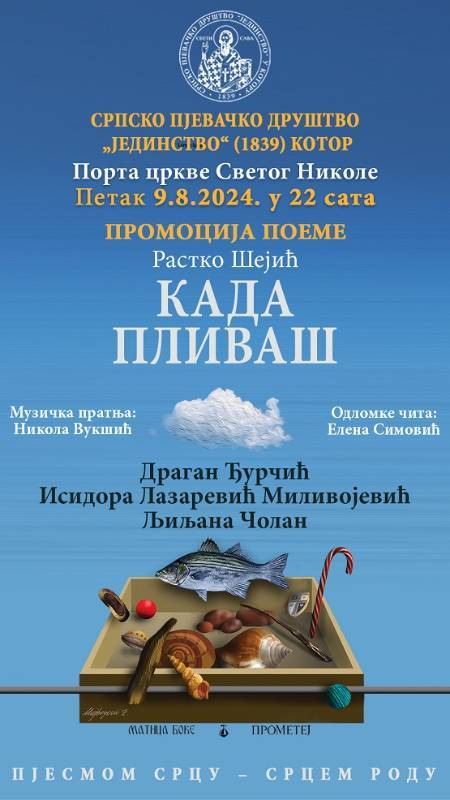
The poem "When you swim" in the doorway of the church of St. Nicholas in Kotor
SPD "Jedinstvo" (1839) Kotor invites to the promotion of the maritime poem "When you swim" by the director and journalist Rastko Šejić, on Friday, August 9 at 10 p.m., in the portico of the Church of St. Nicholas.
Rastko Šejić, a prominent documentary director, journalist and artist of various talents, with many years of involvement in the social and artistic spheres, conveys his deep connection with Boka through the metaphorical poem "Kada plivaš", published by IK Prometej Novi Sad, Matica Boke and the Association "Sta you want".
After successful promotions held in ten cities of the region, the Serbian Singing Society "Jedinstvo" (1839) is returning the poem "Kada plivaš" back to Boka, on Friday, August 9 at 10 p.m., in the gate of the Church of St. Nicholas in Kotor. In addition to the author, the following will speak about the poem: Dragan Đurčić, honorary member and long-time secretary of SPD "Jedinstvo"; Isidora Lazarević Milivojević, professor of French language and literature and Ljiljana Čolan, professor of Serbian language and literature. Excerpts will be read by Elena Simović, a student in the third grade of the Kotor Gymnasium, and the musical accompaniment will be created by Nikola Vukšić, a member of the choir "SPD Jedinstvo".
Book trailer: https://youtu.be/0lVX_SbNu3I
Boka Kotorska has been enchanting artists with its indescribable beauty for centuries. From Šantić's unforgettable verses to contemporary artists, this region remains an inexhaustible source of inspiration. The director Rastko Šejić also joins that current, who, as a "furešt", goes into the depths of the Bokele spirit and brings his original perspective. His poem "When you swim" represents a deep-rooted relationship with Boka, expressed in an urban language and style recognizable to everyone who read and kept the leaflets of the Student Protest 1996/97 and Otpor in the 1990s. Through this geopoetic book, Šejić creates the sacred ritual of swimming as a path to harmony with nature and oneself, at the same time vividly evoking transitional and mental challenges, in the tone of a "melancholic activist" and a "talented swimmer", as critics have called it. According to interpretations, the poem can be read as a complete metaphor for life's storms, but also as "instructions for going to sea". The illustrations of the academic painter Zoran Mujbegović complete the experience of the poems in detail and simplicity of the vignettes.
Criticism of the poem "When you swim"
Željko Komnenović, professor of literature and reviewer of the book: "Šejić swims and through that movement he thinks about people, events, human nature... Really, it reminds me of the paintings of Voj Stanić." It's like you're on that beach, like it's summer. This is a book that should be recommended to everyone as a manual for coming to sea."
Živojin Rakočević, poet, journalist and reviewer of the book: "I have the impression that this book was written in a period when all of humanity said to itself: "How do you breathe? Are you allowed to breathe?" Rastko Šejić needs to write on his breath, to swim on his breath, and to dive on his breath. When you read a poem, you swim with it at the same time, and the verses are made just as much as the swimmer's momentum."
Vladimir Kopicl, writer: "Šejić's collection "When you swim" is a kind of living and engaging textual mirror that verbally cleanly and meaningfully clearly reflects, breaks down and critically synthesizes current images of the technologically and spectacularly stripped world of today."
Dr. Dragana Todoreskov, critic and writer: "The poet strongly evoked swimming as a form of art that requires talent." The sea is there as a form of infinity, it is associated with Gilgamesh and the issue of human transience. There is a well-balanced balance between lyrical moments and epicness."
Dr. Miomir Abović, critic and philologist: "Rastko's poem has a Taoist framework, that the meaning of human life is outside of human civilization." So, civilization is soulless, the individual in it loses himself, the meaning of his life, which is nature itself. In this poem, that nature is Boke's: the sea, the stone, what is personally closest to him."
Dule Nedeljković, writer and reviewer of the book: "When you swim" associated me with the fact that children feel best in the amniotic fluid. We adults look for ourselves in nature. The author gave us that connection in the palm of his hand. Everything is relative, only salt water is absolute."
Vladislava Vojnović, writer and screenwriter: "Throughout the poem, Rastko fights heroically with himself not to say all the terrible things, and to draw attention to himself and all of us to the good."
Milka Kolundžić, writer and critic: "In it are these and those times, modern and original, anti-fascism and capitalism, and everything that stands between the sun and the sea, and they sweep over the head of the one who swims and mourns for the zero of freedom and peace in times when one hand under the pillow is forever holding some kind of weapon."
Pavle Zeljić: "The constant return to the open sea is not an expression of Byronic escapism, a romanticization of melancholic solitude." Before it is even about an agonal attitude towards life as proclaimed by Camus in the essay The Myth of Sisyphus. If we understand Šejić's lyrical subject as irrational, then we don't understand why Sisyphus should be imagined as happy."
Mirjana Lainović, professor of literature: "At the end of the poem "When you swim", we will find ourselves in a similar position as Krtoli on the Luštica peninsula: with one side facing the bay, and the other constantly staring at the open sea, longing for freedom, truth and justice."
Radivoj Šajtinac, poet: "there are no pictures / no memory / the blueness of a sandy heart / the breathing of Rastkovo / readably healing / the breath of poetry speaks"
Jelena Marinkov, poet: "When you swim, it is important and seems to be the most important thing... to swim as far as possible from others, from memory, history, conviction, tribe, country, to find yourself in the strong currents that will bring you back ready from the Adriatic to share that deep blue that informs you with every swing of who you are and what you want."
Aleksandar Dunđerin: "Written on the ruins of traditional humanism, the poem "Kada plivaš" is nevertheless founded above all on the values of traditional humanism, on the need to continue to believe in a better world."
Vesna Popović: "While Crnjanski has the power of melancholy and spiritual presence in the world, Šejić will energetically approach nature." He does not want to change her, but to be close to her. When he dives into another dimension."
Short biography of the author
Rastko Šejić (49) is a director, versatile artist, journalist, propagandist and travel writer. He has a master's degree in economics. During the 1990s, as the head of marketing, he conceptually led movements for the democratization of society - the Student Protest 1996/97, for which he created the slogan "Belgrade is the world", the meaning sign Pravo, hundreds of leaflets and street actions, as well as the Student Movement "Resistance!" in the period 1998/99, of which Šejić was the mastermind. In addition, he led several national campaigns of the non-governmental sector. He worked as a war reporter for Gordana Suša's VIN, was an assistant in professional economic subjects at the university, an architect of websites, an agent of world reggae bands for Eastern Europe... He is the author of the documentary TV series "Na veslu priča", "Brain Drain", "Svetski", "Boka pomorska", "Girls from the Seventies", "Archaeology", as well as a number of documentaries and videos. In 2022, Šejić was awarded the Great Gramta of the Society of Writers of Kosovo and Metohija, and his film "Na veslu priča: Pozdrav pesniku" won the first prize at the Grafest International Festival in 2021.
Excerpts from the poem
When you swim
Deeper and deeper
And he persistently follows you
School of fish
Small silver miracles
They are everywhere
Around you
And you are not food
Already a member
They accept calmly
Course correction
And they pass
Through the fingers
Light touch
And they are leading
And they follow
Now finally
You have someone for you
To vote
For good fish
Literally
...
You own nothing
Thrown in the middle
Thick sea
In the waves of the mountain
While swimming
Further away from the coast
And you drown that one
Stone
What he gave birth to
In the middle of the heart
Deadly arrows
To turn into flowers
You're trying
To breathe in peace
With its width
Of his empty embrace
You're preaching to the birds
Brotherhood
You give yourself the right
To forgive
To myself and to the world
The Unforgiven
Because there is no fight
Without faith
In people
Video excerpts from the poem:
https://youtube.com/shorts/YN99kjzdhvc
https://youtube.com/shorts/bJn5JCc99D8
PHOTOS
RELATED ARTICLES
Calendar for April 24 The Holy Martyr Antipas, Bishop of Pergamum
He is mentioned in the Book of Revelation as Antipas, my faithful witness...
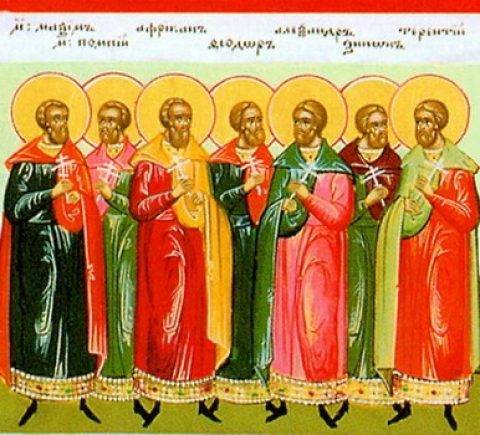
Calendar for April 23 The Holy Martyrs Terentius, Africanus, Maximus, Pompey and Others
They suffered for Christ and were crowned with a crown of glory during the...
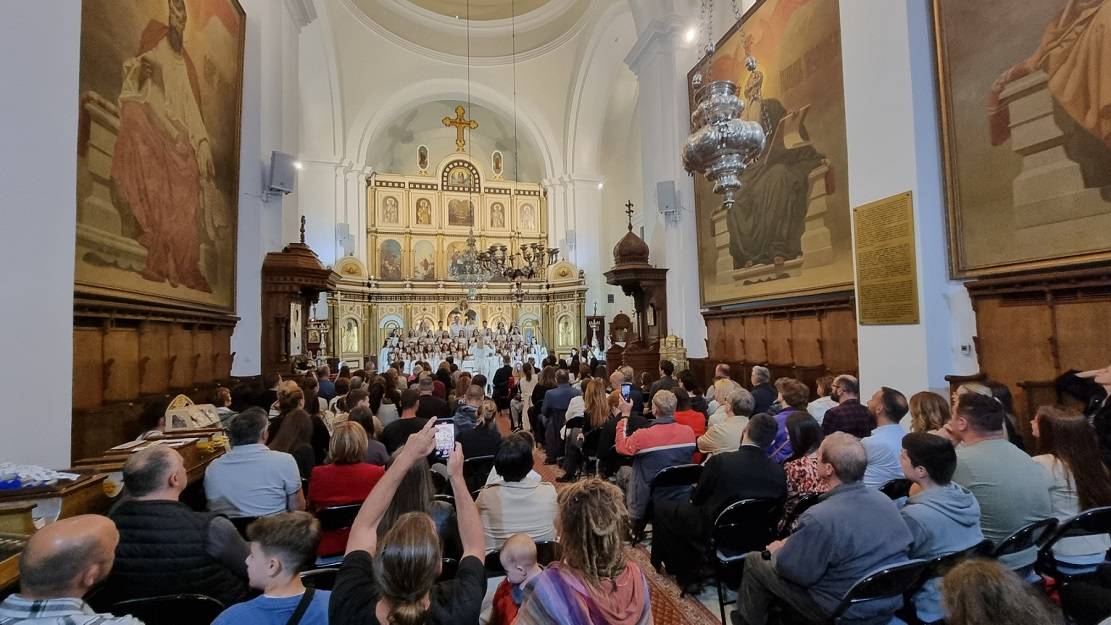
EASTER CONCERT OF THE CHILDREN'S, YOUTH AND SENIOR CHOIR OF THE SPD JEDINSTVO HELD
In the Church of St. Nicholas in Kotor, the Easter concert and another, to say...


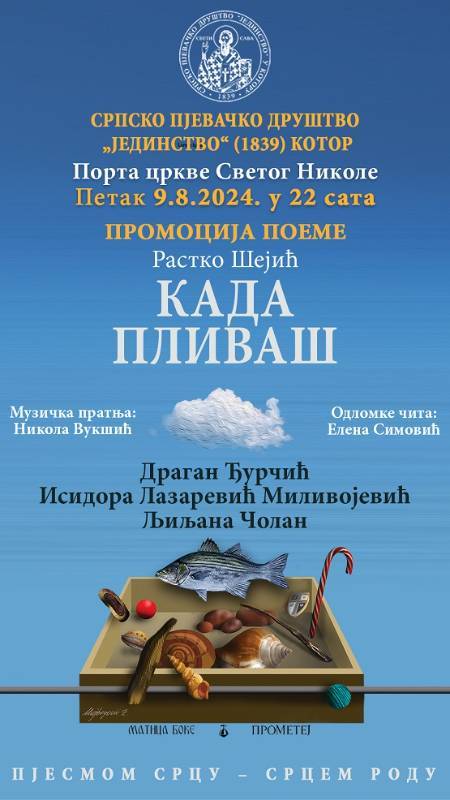

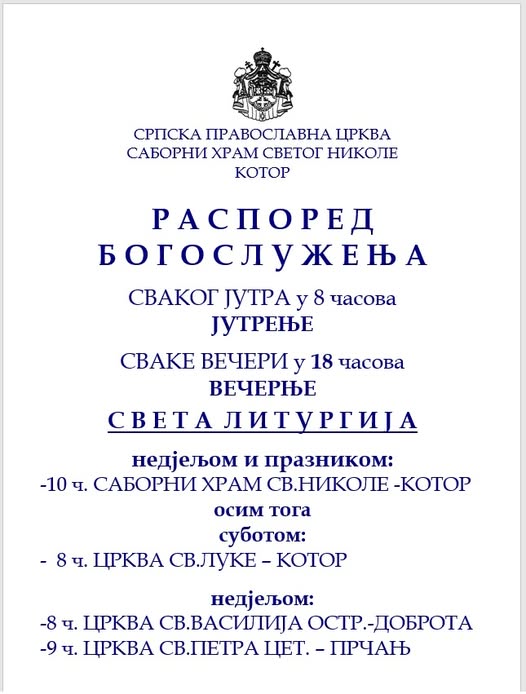
.png)